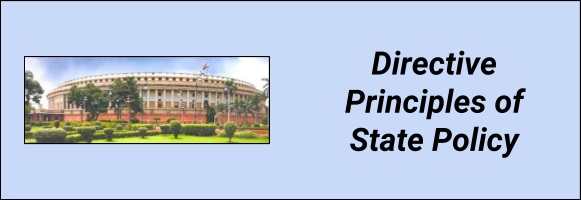(HOT) UPSC Current Affairs 2025 PDF
NEW! The Gist (NOV-2025) | E-BOOKS
Directive Principles Of State Policy : Important Topics for UPSC Exams

Directive Principles Of State Policy : Important Topics for UPSC Exams
DPSP- are enshrined in part IV of the constitution( A36- 51)
-
Borrowed from Irish Constitution.
Some important features-
-
The DPSP basically capsulate the ideas of the people and the ideals which the State should follow or keep in mind while formulating or implementing the policies.
-
They seek to establish a Welfare State as opposed to a regulatory laissez faire State. A Welfare State recognizes the fact that people enjoy some inalienable rights that the Government should not violate and design and implement policies in the same way. Further it is different from the laissez faire as it is not entirely regulatory but also developmental and seeks to establish an egalitarian society.
The DPSP can be said as a concoction of Principles of
-Socialism
-Gandhisim
- Western Liberalism
-Principles of Freedom Struggle of India.
-
The DPSP are primarily made on the basis of Socialistic Principles. A 39 (b)and (c) seek to extend equitable distribution of resources and promote distributive justice.
-
DPSP are non justiciable.ie. not enforceable in court of law. They can be made legally enforceable if incorporated in laws made by the State.
-
Are called the positive obligations of the state as they make the State take positive actions in order to improve the welfare of the society.
UPSC General Studies PRE Cum MAINS Printed Study Material
Online Crash Course for UPSC PRE Exam
Relationship with Fundamental Rights :
The relationship of DPSP with respect to Fundamental Rights has evolved over period of time. In course of time the importance of DPSP was realized in the governance and wellbeing of the country.
Earlier the view of the courts was that the DPSP can’t override Fundamental Rights. However, this view has changed to some extent over period of time.
In various cases like Re Kerala Education Bill 1958, the Supreme Court established that the DPSP though can’t override Fundamental Rights but the state should try to adopt Principles Of Harmonious Construction which states that there is no inherent conflict between DPSP and Fundamental Rights and they both aim developmental and comprehensive democracy and well being society. Therefore,DPSP and Fundamental Rights are supplementary and complementary to each other . Hence the Courts had the responsibility of making judgements to interpret constitution in such a way that on the one hand they harmonize social objectives and on the other hand protect the Fundamental Rights of the individuals. So, the FR should have same regard as the DPSP. However , in case of conflict if only one interpretation is possible then the Courts shall give preference to FR over DPSP.
Various enactments and amendments :
Parliament enacted 25th Constitutional Amendment- introducing A 31(c)- stated that the State can make law to give effect to DPSP under A39(b) and (c) and such a law violating FR 14,19,31 shall not be declared unconstitutional , and such a law shall not be questioned before court of law.
The Supreme Court in Keshavanand Bharti case upheld the 1st part of this amendment but struck down the other part on the ground of JUDICIAL REVIEW.
So , A 39(b)&(c) can override FR 14,19,31.
Further Parliament introduced 42nd Amendment Act amending A 31(c) and read that any law enacted by the State to give effect to any DPSP violating A14,19,31 shall not be declared unconstitutional or void,making an attempt to completely override FR under the pretext of giving effect to DPSP.
(originally Right to Property was dealt by A 19 (f)and A 31)
The Supreme Court in Minerva Mills case struck down changes introduced by the 42nd amendment.
44th Amendment Act 1978, removed Article 31 C from the list of Fundamental Rights.
Therefore , at present 2 DPSP given under A 39(b)and (c) may take precedence over 2 FR given under A 14 & 19.
Significance of DPSP
Dr. B R Ambedkar described DPSP ‘’like the instruments of instructions’’.
The DPSP have not been given legal enforceability not because they are inferior to FR in any way but because its implementation required huge time and resources to be immediately available with the State as they are the positive obligations of the State, which the State may or may not have given other priorities also. Therefore the makers of the constitution didn’t make it legally enforceable in court of law.
However, they are in a way enforceable in Court of People as they enjoy political sanctions. Thus they keep reminding the Government about its responsibilities.
Classification :
Have been classified under 3 categories (constitution doesn’t make any categorization .Merely informal for the purpose of understanding)
-
Social Principles
-
Gandhian Principles
-
Liberal-Intellectual Principles
Difference between DPSP and FR
| DPSP | FR |
|
|

